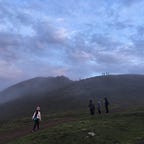“Be brave. Take risks. Nothing can substitute experience.” — Paulo Coelho
In today’s day and age, it is all too easy to believe we know things we don’t. More and more people are talking in terms of speculation, myself included.
Recently I’ve tried not to spend too much time within the boasting environment of Linkedin, because it reinforces within me an illusion of success. Does experience really qualify my skills and ability to learn? Does anybody really know what they’re doing?
The truth is knowledge acquisition is hard. We think Google has our back, but that’s information. Knowledge needs to be understood, reasoned, analyzed, visualized, and put into practice — or at least questioned and compared as a data point. There is a world of difference between having information at your fingertips, and seeing the world through the lens of an article that made a big impression on you for years. The former is passively scrolling through, while the latter is a commitment to live and participate in the realization of an idea.
This difficulty exists, and rightfully so! Imagine knowledge that can figuratively seep into your bones. We would only want the best nutrients stored in our bones. Because we would only want our decisions guided by solid understanding. Therefore, the challenge of internalizing information is like the mind’s way of conducting due diligence: do you really know what you’re talking about? Should we really store this concept in ourselves, or is this overly attractive noise that we should filter out?
“What gets us into trouble is not what we don’t know. It’s what we know for sure that just ain’t so.” — Mark Twain
Another metaphor is to view information as dumbbells. You can buy the gym equipment, but it just sits there until you use it. The neuroplasticity of your brain is like a muscle (based on my limited knowledge). Just as you have to actually lift up the dumbbells to stretch out your muscle fibers, one must do the heavy lifting of rigorous attention and interrogation to stretch our mental capabilities.
Some examples in my life of interacting with information are: annotating books, explaining articles to myself or friends, learning technical skills on the path to building things, creating mental habits out of someone else’s wise words, and synthesizing many ideas through writing.
How do you know when you know something? You don’t. But if you can elucidate the challenges of knowledge acquisition from your personal experience, you might just be halfway there.
